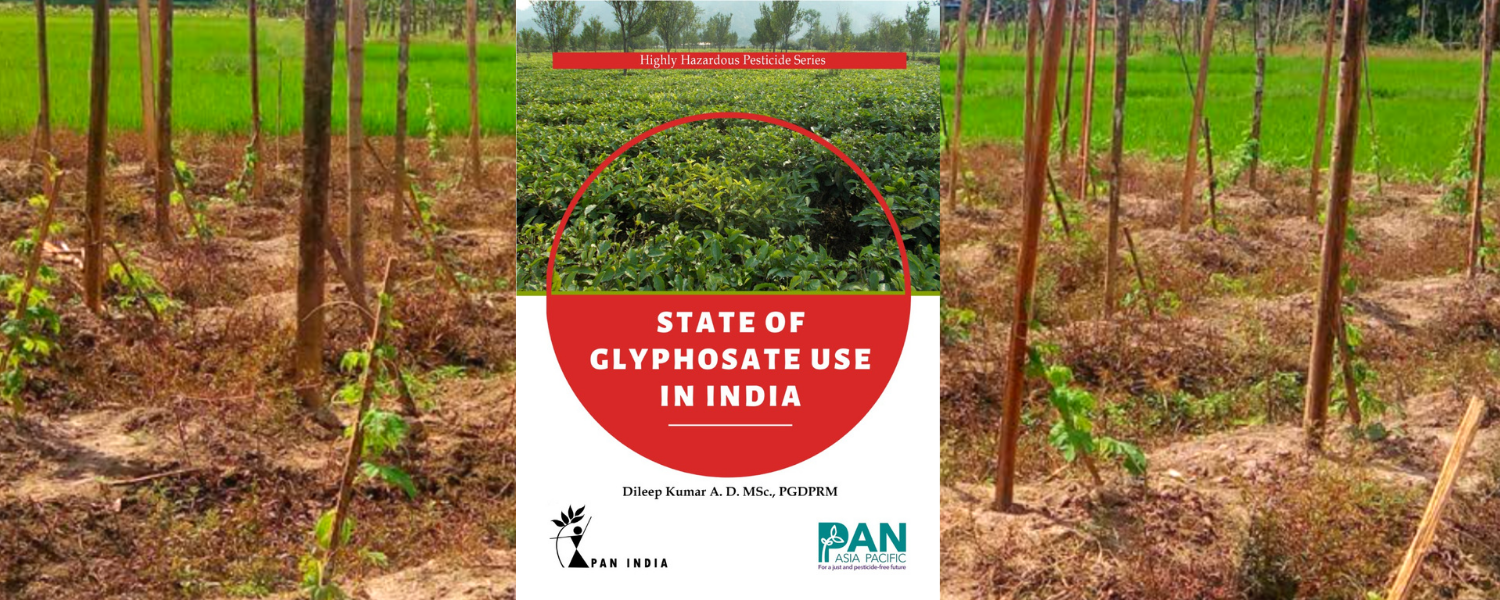A new study released by Pesticide Action Network (PAN) India and PAN Asia Pacific (PANAP) shows that glyphosate is being used in seven Indian States illegally, with the study monitoring at least 20 non-approved uses of the cancer-causing herbicide, 16 of them in food crops.
The study, entitled State of Glyphosate Use in India and written by Dileep Kumar, was launched on October 16 World Hunger Day and can be downloaded here.
Based on surveys of 300 farmers, farmworkers and retailers, as well as data from official sources, the survey reveals that glyphosate use in Andhra Pradesh, Jharkhand, Himachal Pradesh, Karnataka, Tamil Nadu, Karnataka, Telangana and West Bengal violate national regulations as well as the International Code of Conduct on Pesticides Management. Statistical data shows that glyphosate is the second most highly produced and consumed herbicide in India, following 2,4-D.
In the study, around 77 % of farmers and 41 % of workers reported use of glyphosate in weed control for several crops, all of them for non-approved use. The Department of Agriculture, Cooperation and Farmers Welfare, Government of India states that glyphosate formulations are only “registered to be used in Tea Plantation Crop and non-plantation area accompanying the Tea crop.”
None of the farmers or workers interviewed reported use of recommended Personal Protective Equipment or PPE while working with glyphosate or working in fields sprayed with glyphosate; rather, some of them reported use of a cloth, hat, mask, gloves, or goggles of poor quality as safety measures. Recommended PPE were also not being sold in pesticide retail points where the field study was conducted.
Product label analysis for glyphosate also reveals that there were no proper information on the use of PPE, application dosage, proper disposal of containers, and minimum precautionary statements. The study also noted a number of practices that could lead to hazardous exposure, such as storing glyphosate in house premises, washing of spray equipment near drinking and household use water sources, and the reuse of glyphosate containers for household purposes.
Exposure to glyphosate was reported by a considerable percent of respondents due to spillage and wind drift. Respondents also reported experiencing ill effects such as burning sensation, eye irritation, nausea, vomiting, dysentery, headache, fever, skin fissures, increased heart rate, urinary infections, body pain, and general weakness.
Six Indian states have already imposed stringent restrictions, temporary bans or cancellation of licenses for glyphosate-based herbicides, citing indiscriminate use as well as health and environmental concerns. On 7 July 2020, the Government of India has issued a draft glyphosate restriction order, wherein it can be used only through Pest Control Operators; the order has yet to be finalised after the deadline for public comment was extended until October 4. Several groups, including PAN India and PANAP, are calling for a total ban on glyphosate.
“PAN India has developed this report primarily to increase awareness of people about glyphosate, its toxicity, and the usage patterns. It will be our endeavour to keep updating this report, periodically, in order to present cogent and concise information for people in general. Farmers, farm labour and policymakers need to learn about this most hazardous and carcinogenic agrochemical,” said Dr. NarasimhaReddy, PAN India honorary director, in the study’s preface.
Glyphosate is included in PANAP’s list of 20 Terrible Pesticides that are Toxic to Children. To know more about glyphosate, download PANAP’s monograph.








Discussion about this post